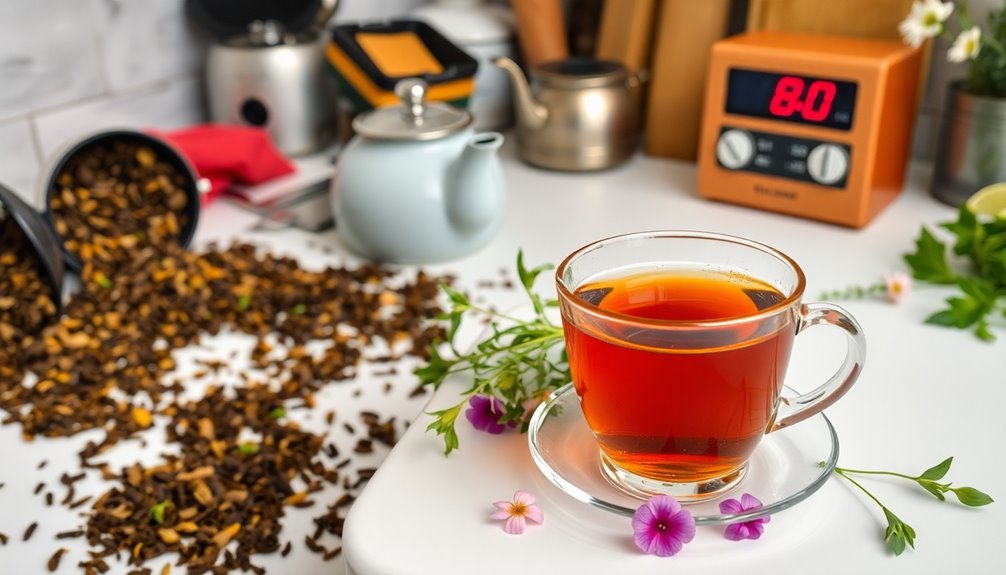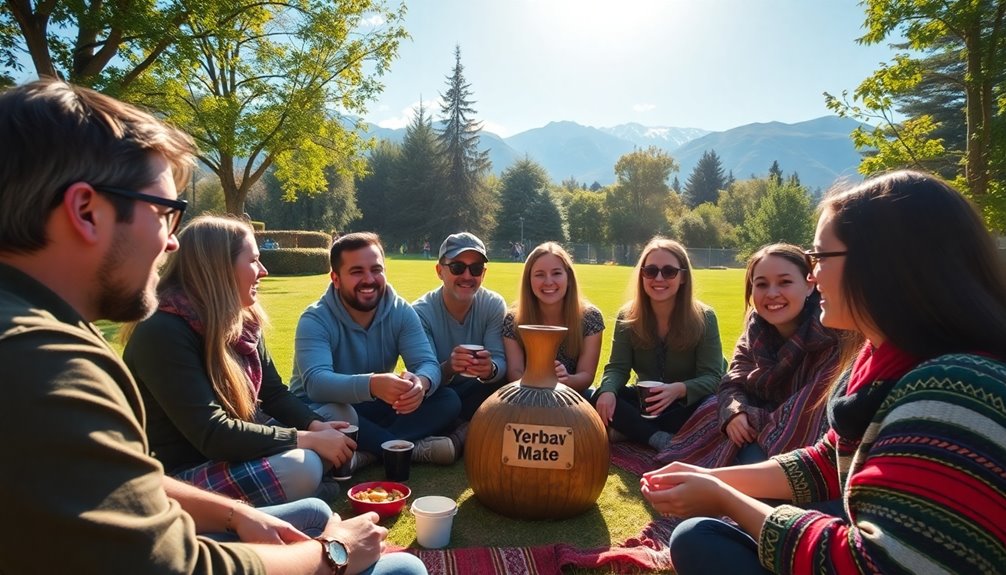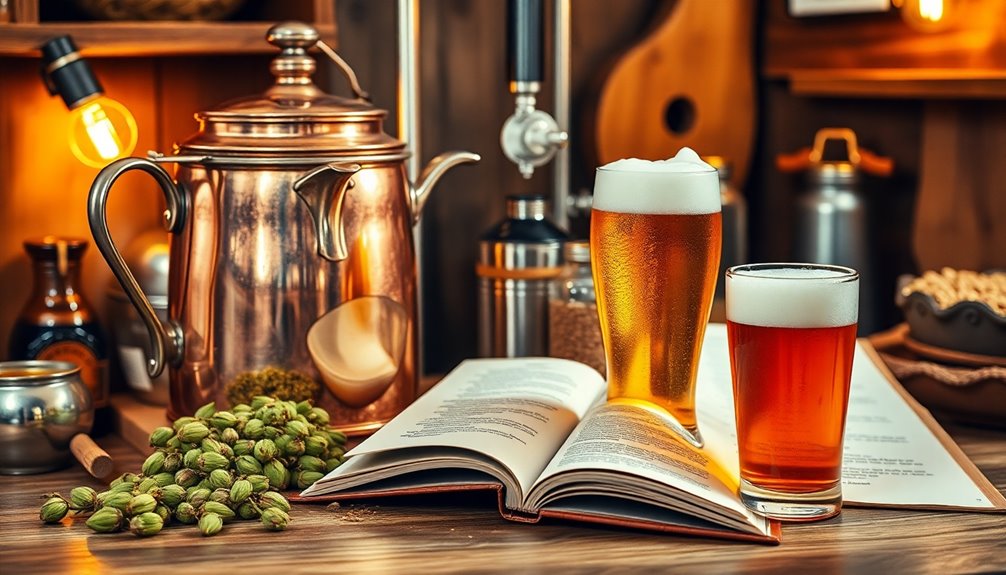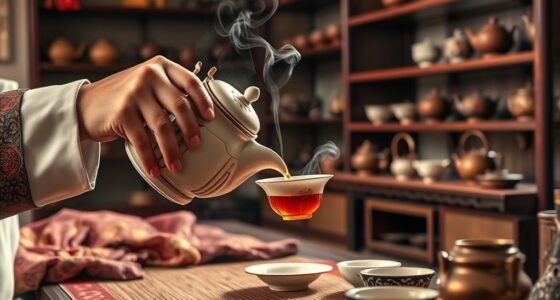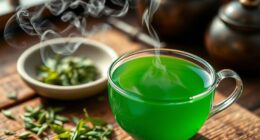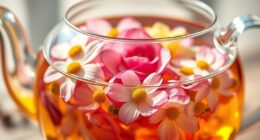Brewing delicious tea can be a little tricky, but avoiding five simple mistakes will help elevate your cuppa! First, make sure you're using the right water temperature; green tea likes it cooler around 160°F, while black tea enjoys boiling at 212°F. Next, use filtered water instead of hard tap water for better flavor. Over-steeping makes tea bitter, so follow the recommended times for each type. Don't forget to pre-warm your teapot or cup to maintain heat. With these fixes, you'll enjoy every sip more! Stick around, and you'll discover even more tips for the ultimate tea experience!
Key Takeaways
- Use filtered water instead of hard tap water to enhance the taste of your tea.
- Always pre-warm teapots and cups to maintain optimal brewing temperature.
- Follow specific steeping times for each tea type to avoid bitterness or weak flavor.
- Brew green and white teas at 160°F to 180°F; black and oolong teas require boiling water at 212°F.
- Avoid over-steeping to prevent bitterness; aim for the recommended steeping duration for each tea.
Introduction
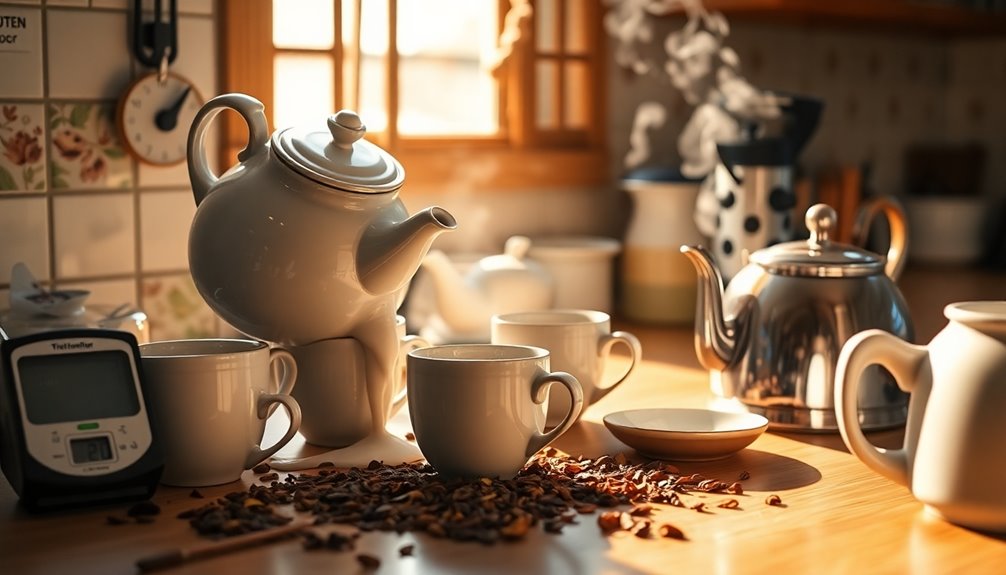
Brewing tea can be a delightful experience, but making common mistakes can ruin your cup. If you're brewing tea improperly, you might end up with a bitter or dull flavor. One of the biggest culprits is the water temperature; using water that's too hot or too cold can mess with your tea's flavor profile.
Make sure you're using filtered water too, because hard tap water can have a negative effect on taste.
Another key aspect is steeping time. Over-steeping your tea leaves can lead to an unpleasantly bitter brew, while under-steeping can leave you with a weak flavor that's just sad.
Tea's Cultural Significance Worldwide
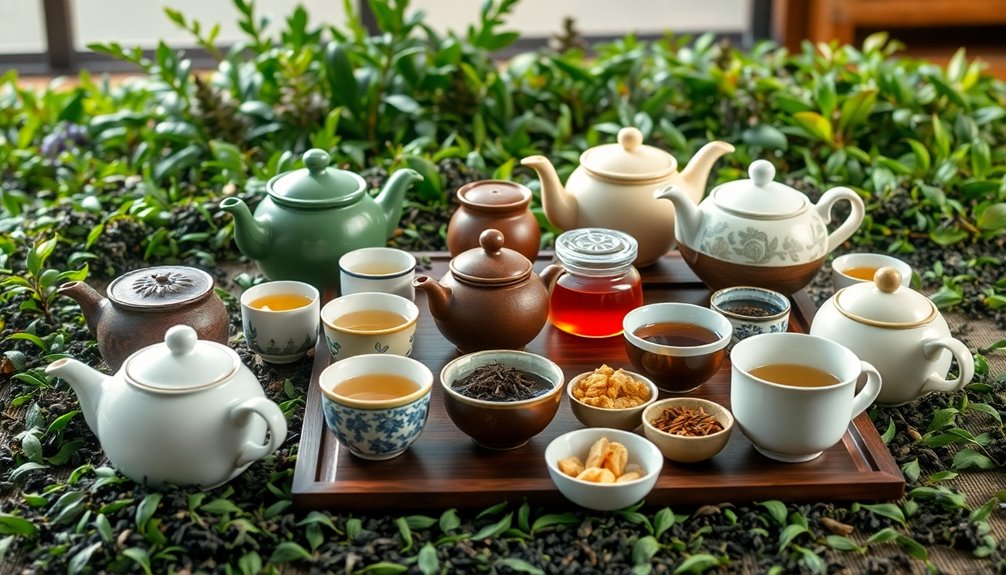
Across the globe, tea serves as more than just a beverage; it embodies cultural traditions and social rituals that connect people.
In Japan and China, tea ceremonies highlight the importance of mindfulness and the careful brewing process, showing respect for every drop. Meanwhile, in Britain, afternoon tea has turned into a delightful social gathering, blending tea with tasty treats, making it a cherished tradition.
When you think about hospitality, the Moroccan tea ceremony stands out with its unique pouring technique and refreshing mint tea, welcoming friends and family with open arms.
In India, chai isn't just a drink; it's a part of everyday life, bringing communities together and enhancing cultural identity.
Throughout the world, many cultures use infused teas for their medicinal purposes, reminding us of tea's historical roots in traditional medicine.
These wellness practices show that tea isn't just for sipping; it's also for feeling better!
Water Temperature Affects Flavor
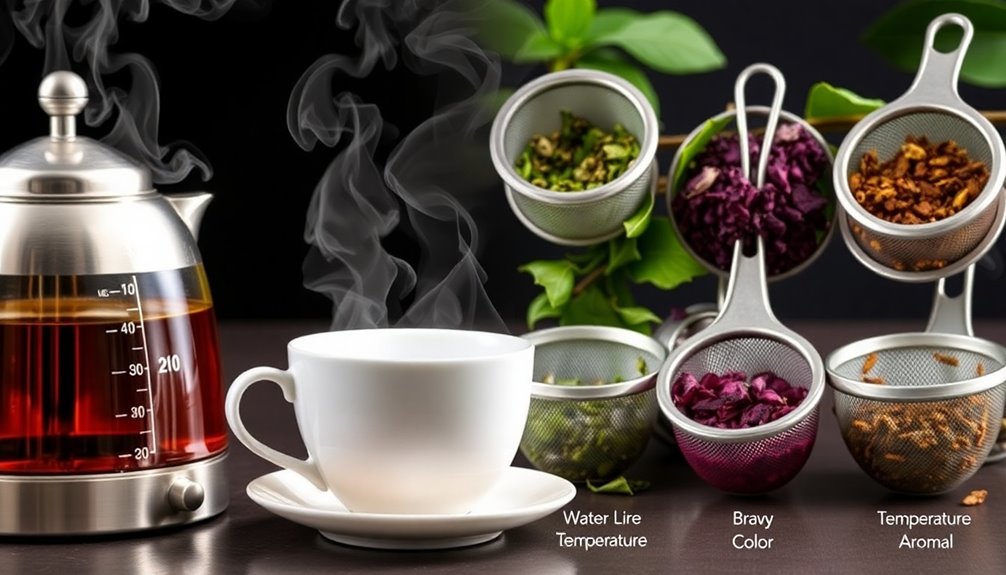
The temperature of the water you use can make or break your tea experience. If you want to enjoy the delicate flavor of green teas or white teas, remember to use water between 160°F to 180°F. Using boiling water at 212°F can "stew" those gentle leaves, making your tea taste bitter and flat.
Instead, let those lovely notes shine through by steeping your loose-leaf teas at the right temperature!
On the other hand, black teas and oolong teas thrive in boiling water. Their bold and robust leaves can handle the heat, allowing you to extract their complex flavor.
Just keep in mind that if you over-boil the water, it loses valuable oxygen, which means your tea may taste a bit dull.
Each tea type has its own perfect water temperature, and following these guidelines is the key to brewing a delicious cup.
Tea's Impact on Mindfulness
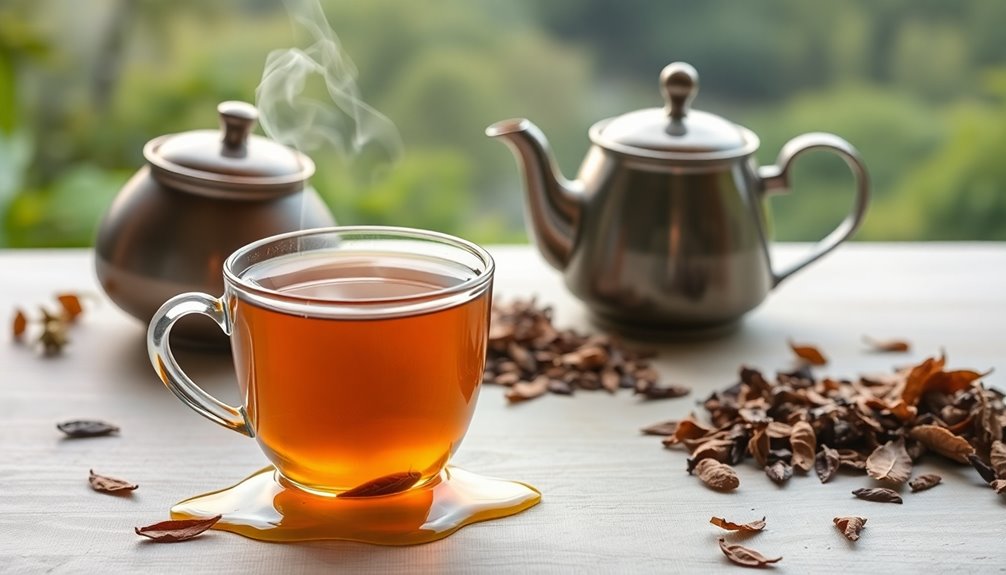
Enjoying a well-brewed cup of tea isn't just about flavor; it also offers a unique opportunity to practice mindfulness. When you brew tea, you engage in a delightful process that can help you slow down and appreciate the moment. Measuring the leaves, pouring hot water, and watching them steep creates a wonderful ritual. The process of brewing tea can be as intricate as preparing a double shot of espresso, requiring attention to detail and patience.
This simple act can turn into a meditative practice, allowing you to focus your mind and reduce stress. Additionally, regular consumption of herbal teas can enhance overall well-being, further enriching your mindfulness experience. Notably, certain teas, such as green tea, are known for their high levels of antioxidants that can benefit your health.
Herbal teas, like chamomile and lavender, are especially good for mindfulness. They're calming and help you relax, making each sip a cozy experience. As you savor the full flavor of your tea, you connect with the present, appreciating the warmth and aroma.
Plus, research shows that the antioxidants in teas, especially green tea, can even boost your cognitive function! Drinking green tea, which is rich in antioxidants, can enhance your overall well-being and mental clarity.
Caffeine Content Misconceptions
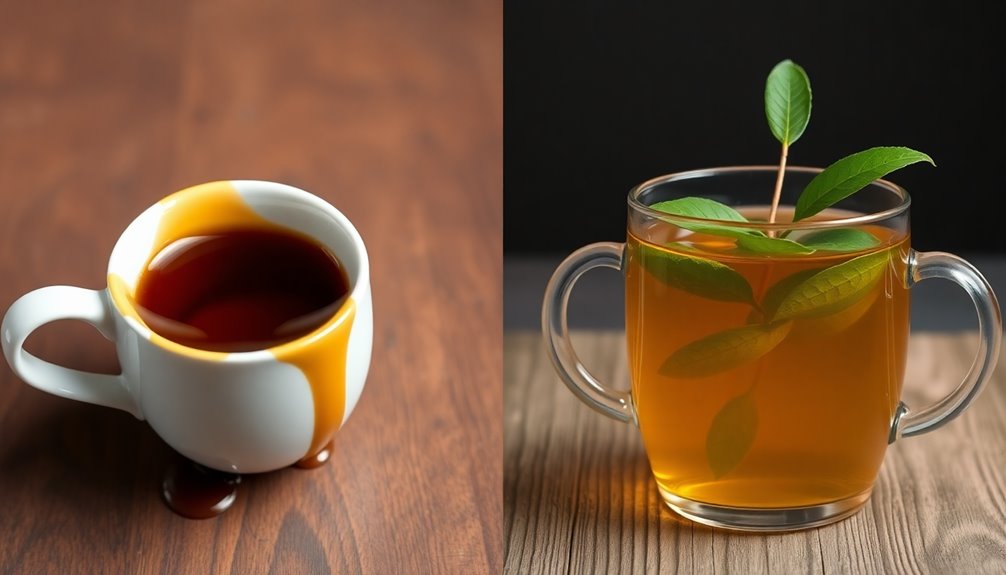
Why do so many people believe that all tea has the same caffeine content? It's a common mistake! While tea offers a delightful range of flavors, the caffeine content varies quite a bit depending on the type of tea.
For instance, black tea usually has about 40-70 mg of caffeine per 8-ounce serving, while green tea has around 20-45 mg. Surprising, right? Even white tea can pack a punch, with some varieties having up to 75 mg!
When steeping tea, factors like steeping time and water temperature affect how much caffeine is extracted from the leaves. If you're using loose-leaf tea, you might notice a bigger difference in caffeine levels compared to tea bags.
And remember, herbal teas aren't truly teas; they often contain little to no caffeine, making them perfect for those who want to avoid caffeine altogether.
Understanding the caffeine levels in different types of tea can help you make informed choices. So, next time you brew a cup, think about the flavor of the leaves and how they'll influence your caffeine fix! Enjoy your tea adventure!
Practical Applications
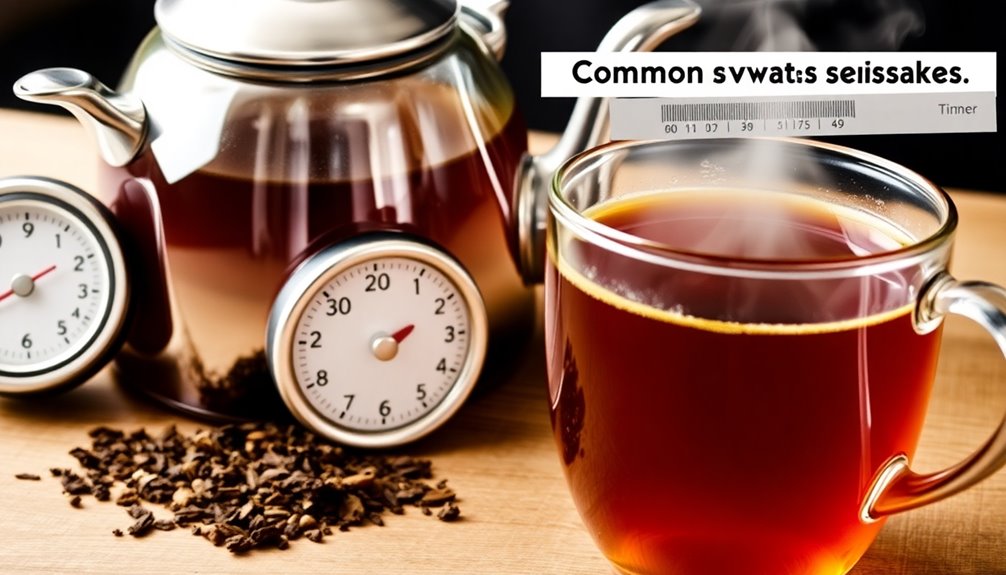
When brewing tea, knowing a few practical applications can elevate your experience significantly.
First, always use the right water temperature! Different teas need different temperatures to unlock their flavors. For example, black tea loves boiling water, while green tea prefers cooler water. Using filtered or spring water helps too, since hard water can ruin your drink.
Next, don't forget to pre-warm your teapot or cup. Rinsing them with hot water keeps the brewing temperature just right, so your tea doesn't cool down too quickly.
Also, watch out for over-steeping tea! If you steep too long, you'll end up with a bitter cup. Stick to the recommended steeping times: about 3-5 minutes for black tea and just 1 minute for green.
If you're using loose leaf tea, remember it can often be steeped multiple times, giving you different flavors with each infusion. Choose larger infusers or even a French press!
Using filter bags may limit space for the leaves, so make sure they've ample room to expand and release their deliciousness.
With these tips, you're all set for making a great, flavorful cup of tea!
Frequently Asked Questions
Can You Fix Over Brewed Tea?
Yes, you can fix over-brewed tea! Just dilute it with hot water, mix in some fresh tea, or add milk or sweetener to mask the bitterness. Next time, use a timer to avoid over-brewing.
What Are the Mistakes When Making Tea?
When making tea, you might over-steep, use boiling water for delicate leaves, or ignore water quality. Not pre-warming your teapot and miscalculating tea leaf quantities can also lead to disappointing brews.
How Do You Save Brewed Tea?
To save brewed tea, dilute over-steeped tea with cold water or milk. For flat flavors, add fresh herbs or citrus. If it's too strong, mix in hot water or ice, depending on your preference.
How to Fix Weak Tea?
To fix weak tea, adjust your tea-to-water ratio, steep longer based on the type, and use fresh, filtered water. Also, ensure the water's at the right temperature for the best flavor extraction.
Conclusion
Now that you know the five brewing mistakes that can ruin your tea, you're ready to sip like a pro! Remember, using the right water temperature, understanding caffeine, and embracing tea's calming effects can make your experience even better. So go ahead, brew that perfect cup and enjoy every delightful drop. With a little practice, you'll impress your friends and family, and who knows, maybe even start a tea party! Cheers to your tea adventures!

